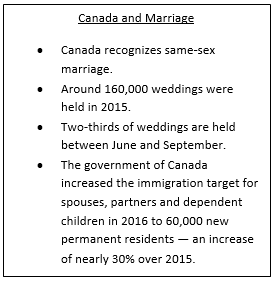A Marriage Made in Heaven: Canada, Immigration and Getting it Right Before and After the Big Day
 It’s wedding season across Canada, with thousands of couples saying “I do” from coast to coast. For many, this occasion not only marks a marriage of two people, but two cultures as Canadians marry their foreign partners. And although much of the attention is on the wedding day itself, couples and their guests alike have much to consider when it comes to ensuring that their experience of Canadian immigration and customs is a smooth one.
It’s wedding season across Canada, with thousands of couples saying “I do” from coast to coast. For many, this occasion not only marks a marriage of two people, but two cultures as Canadians marry their foreign partners. And although much of the attention is on the wedding day itself, couples and their guests alike have much to consider when it comes to ensuring that their experience of Canadian immigration and customs is a smooth one.
Over the coming years, it is possible that the number of marriages between Canadian citizens or permanent residents and their foreign partners will increase. The government of Canada has made it clear that it wants to boost the numbers of international students in Canada, and the country is also expected to continue to welcome foreign workers and visitors in large numbers. Canada’s immigration minister, John McCallum, recently announced plans to double or even triple the number of visa offices in China.
 While other countries around the world adopt more protectionist policies, Canada is bucking the trend. Canada’s global outlook allows people from around the world to meet Canadians easily, and the decision to study or work in Canada could lead to a life-changing relationship, resulting in a marriage. But before the wedding can take place, there is much to consider.
While other countries around the world adopt more protectionist policies, Canada is bucking the trend. Canada’s global outlook allows people from around the world to meet Canadians easily, and the decision to study or work in Canada could lead to a life-changing relationship, resulting in a marriage. But before the wedding can take place, there is much to consider.
Pre-Wedding Considerations
With an average of 129 guests attending weddings in Canada, chances are that a number of them will be visiting from abroad. Once a wedding date has been chosen and invitations sent, invited guests should be aware that visitors to Canada must have either a Temporary Resident Visa (TRV) or, in the case of citizens of visa-exempt countries, an electronic Travel Authorization (eTA). The main exception to the eTA requirement is U.S. citizens, who do not need to obtain an eTA or a TRV.
The eTA is a new pre-screening mechanism first introduced in 2015 that will be mandatory as of September 29, 2016. The previous issue of CICNews reminded potential visitors to Canada of the importance of disclosing truthful information, as not doing so could lead to the disappointment of being denied entry to Canada. To determine whether you and your family or friends need an eTA or a TRV and to learn the next steps, use the exclusive Visiting Canada Tool.
Another crucial consideration is criminality, a reality that stumps many would-be visitors to Canada each and every day. Although a full list of previous offences that could spoil a guest’s visit to Canada would be too long for the purposes of this article, such offences may include driving offences, petty theft, and simple assault. To learn more, read our exclusive article from last month: Criminal Inadmissibility to Canada: Summer Vacation Season Brings Fresh Concerns. Guests who have concerns about possible criminal inadmissibility issues are encouraged to contact an experienced attorney in advance of their scheduled departure for Canada.
Wedding guests should also take into consideration the regulations on travelling to Canada with gifts. To learn more about this, click here.
Immigrating to Canada Permanently through Spousal Sponsorship
For the newlyweds who want to settle in Canada, it is not always necessary to wait until after the wedding in order for the foreign partner to apply for permanent resident status. If the couple can prove that they have been living together for at least 12 months, the foreign partner may be eligible to apply for Canadian permanent residence as a common-law partner. There are two routes to permanent residence through this category: outland and inland.
An Outland application is generally pursued when the sponsored partner is living outside Canada. However, Outland applicants can still be in Canada and apply through the Outland program. Outland applications are processed through the visa office that serves the applicant’s country of origin, or where they have been lawfully admitted for at least one year.
Inland sponsorship may be done when the couple is together in Canada and the foreign spouse/common-law partner has temporary status in Canada, either as a worker, student, or visitor. The downside to the Inland route is that applications typically take longer to process. However, the person being sponsored may be eligible for an open work permit while the sponsorship application is being processed. In December, 2014, the government of Canada launched a pilot program through which sponsored persons through the Inland route may be issued open work permits before the ‘approval in principle’ decision has been made on their application. This pilot program was extended in December, 2015, and remains in place at the time of writing.
If an Inland applicant chooses to leave Canada during the application process, it is at the discretion of Canadian immigration authorities as to whether the sponsored person may re-enter Canada during the process; it is also at their discretion as to whether the application may continue to be processed if the sponsored person leaves Canada during the process.
Pursuing permanent residence through an economic program
A non-Canadian spouse of a Canadian partner may also pursue permanent residence through an economic program. The main advantage of doing so is the expedited processing times for certain programs. For example, applications made through the Express Entry selection system are typically processed in less than six months. However, Express Entry candidates must first be invited to apply for permanent residence after first making an expression of interest in immigrating to Canada. The government issues these Invitations to Apply (ITAs) on a priority basis according to a points system. Permanent residence may also be obtained through one of the various Provincial Nominee Programs (PNPs).
Removing stress where possible
“As anyone who has experience can testify, organizing a wedding can be stressful enough, and that’s before additional considerations surrounding customs and immigration,” says Attorney David Cohen.
“Before the confetti can be thrown and the cake cut, it’s important to ensure that guests know about the procedures to enter Canada. Over the past few months we have seen the introduction of the eTA system for visa-exempt visitors, and in the near future we are expecting new visa offices to open for those who require a TRV. Therefore, even individuals who have previously visited Canada may be faced with new, and potentially confusing, protocols.
“As for after the wedding and settling in Canada, newlyweds have important decisions to make. There are advantages to pursuing one program over another, but, as I always say, each immigration case is unique. The key is charting out a path that is tailored to your objectives and needs.”
To find out if you and/or your spouse/common-law partner are eligible for sponsorship, please fill out a free online assessment today.
If you have any questions or concerns about the process of gaining entry to Canada, please send a detailed email to eta@canadavisa.com.
© 2016 CICnews All Rights Reserved
- Do you need Canadian immigration assistance? Contact the Contact Cohen Immigration Law firm by completing our form
- Send us your feedback or your non-legal assistance questions by emailing us at media@canadavisa.com






